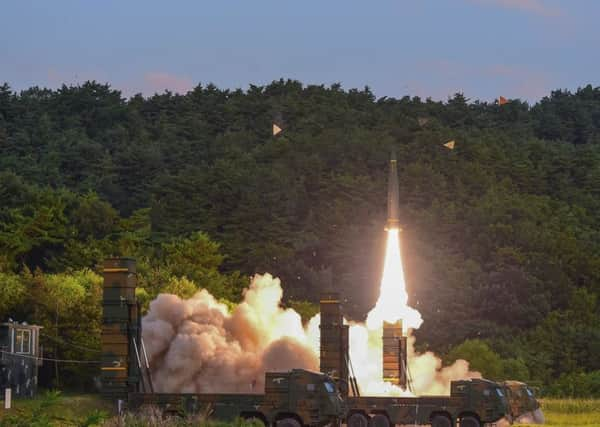Adam Cathcart: Crucial China role in North Korea impasse


Yet, after a spring and summer of crisis in Asia, there is a temptation to regard the current stand-off between the United States and North Korea’s missile and nuclear programmes as a kind of over-hyped boxing match between two very brash men.
The tendency of President Trump to regard all politics as personal, and the zeal of his followers to pounce upon his real and perceived enemies, perpetuates this view.
Advertisement
Hide AdAdvertisement
Hide AdKim Jong-un may seem tailor-made as a Trump adversary. With his missiles, nuclear warheads, party dictatorship and retro personality cult, Kim is an international rogue who (to some) can only be tamed by a bigger, brasher rogue.
But any reading of the current stand-off requires greater historical context. Kim Jong-un and his family have, in effect, been at war with the United States in Asia since North Korea’s founding in 1948. Any strategy which the state is implementing in order to defend its country and perpetuate this dynasty has been in the making for decades. Yesterday’s nuclear test is part of that strategy.
The United States, with much support and sacrifice from British troops and the UN, prevented North Korea from unifying the peninsula under communist rule in 1950. Today North Korea’s nuclear and missile programs are meant to serve the Kim family’s consistent goal of forcing the current 28,500 American troops off the peninsula and unifying the country.
Apart from his habit of incautiously tweeting, Trump is not so different from his predecessors in the Oval Office. His administration’s overall strategy thus far toward North Korea has not differed much from Obama’s.
Advertisement
Hide AdAdvertisement
Hide AdTrump is locked into an American national security strategy in the region where international alliances bolster his potential firepower against North Korea. But these alliances also slow any possible use of force.
Like the UK extracting concessions about nuclear consultations from Harry Truman during the Korean War, Trump is bound to consult with South Korean and Japanese alliance partners from whose territory any operation would likely be launched or supported.
Judging from the words of its new Foreign Minister, the Japanese cabinet now seems most prone to supporting any kind of a preemptive action against North Korea. But the deep reservoirs of public pacifism in Japan, and its unchanged peace constitution, make such an action unthinkable. Not only that but coordination between Seoul and Tokyo is hampered by ongoing distrust and lingering historical issues.
China is the third factor that proves the North Korea problem is much more complex than a simple stand-off between Pyongyang and Washington. China has increasingly been described as the essential power when it comes to pressuring North Korea. While this is true, what is too often lost is a discussion of what China has to lose in the event that it pushes North Korea too far, too fast. It is not just a North Korean collapse that is feared by the Chinese, but the possibility of a disintegrating security situation on its long eastern border, which is why they have called for calm on all sides.
Advertisement
Hide AdAdvertisement
Hide AdIf Donald Trump, like his predecessors, thinks that behind-the-scenes talks can disrupt the North Korean missile and nuclear programmes, he is likely to be disappointed. Like America’s narcissistic chief executive, the Chinese leader Xi Jinping is also eager to burnish his own personality cult. But rather than flailing at North Korea verbally in public, Xi instructs his state news media to downplay the recent unrest in the region.
Donald Trump may indeed possess an overwhelming sense that he alone can leverage Kim Jong-un into giving up his arms and changing the fundamental structure of the US conflict with North Korea. With every tweet his supporters anticipate a satisfying knockout against Kim Jong-un.
But the historical depth of the US-North Korea conflict, the regional alliance structures with the United States and the tendency of the Chinese leadership to simply muddle along mean that apart from a direct attack on Guam, Tokyo, or Seoul, Kim Jong-un is likely to survive with his own personality cult – and weapons – intact.
Adam Cathcart is a lecturer in Chinese history at the University of Leeds